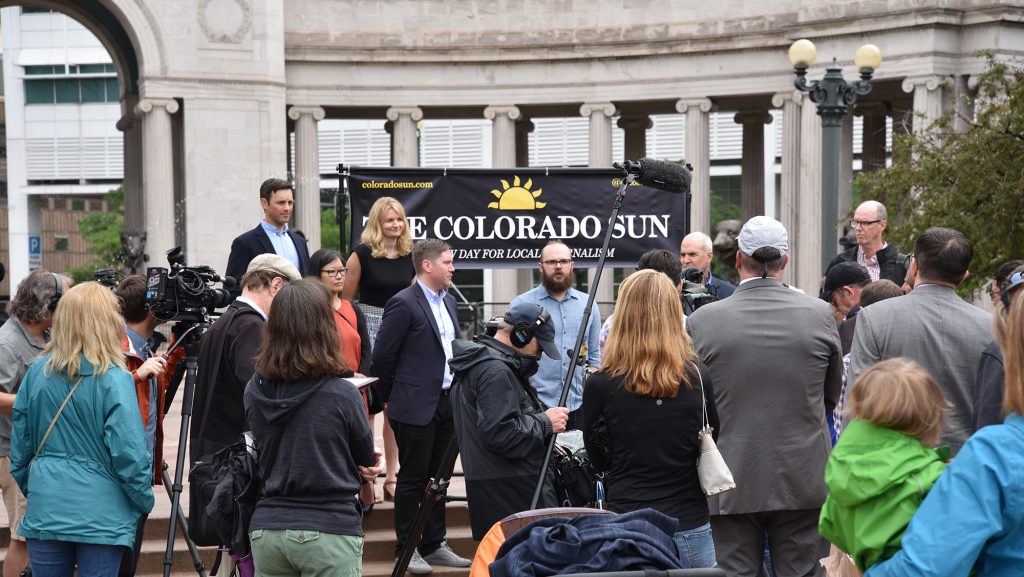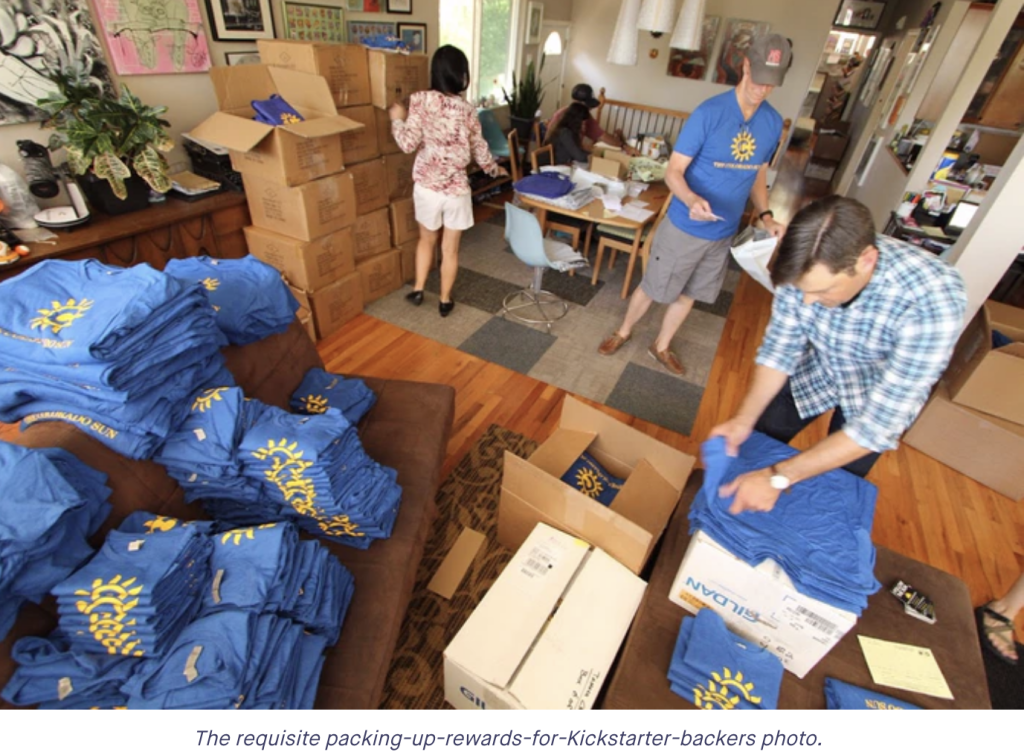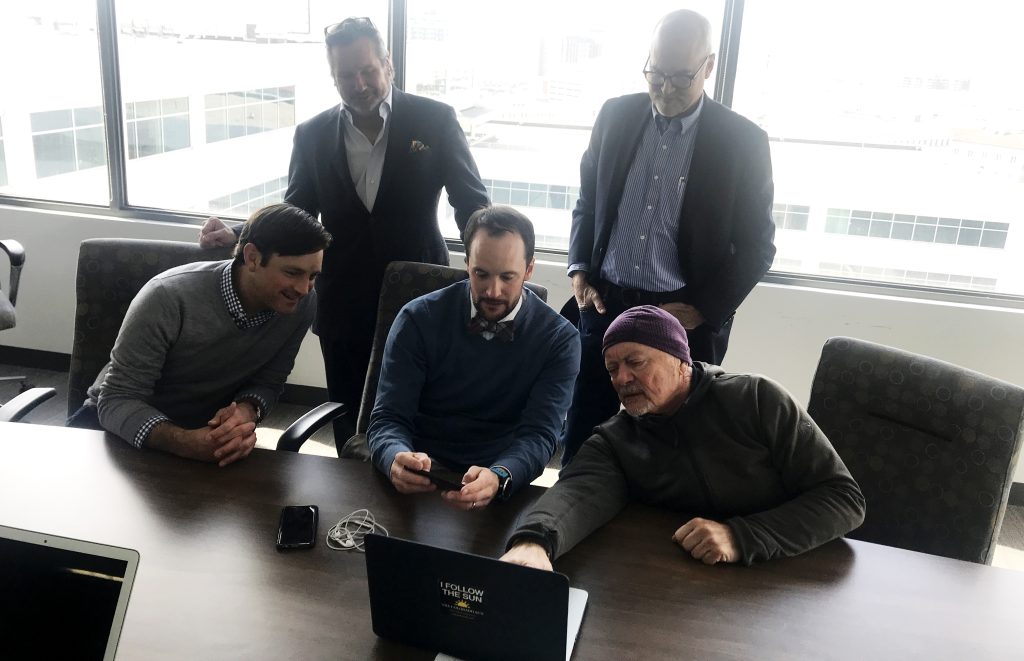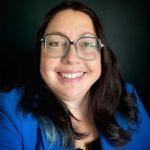Delivering news onto a digital porch
This summer for Innovation in Focus we are exploring news organizations which function through new, emerging or unique revenue models
The Colorado Sun is a journalist-owned and run, ad-free news site based in Denver that was launched on September 10, 2018. Their newsroom consists of 11 full time journalists. I spoke with Dana Coffield and Larry Ryckman to learn about how the year has progressed, hear some lessons learned and see where they’re headed next.

Duncan: I saw The Colorado Sun is a civil newsroom and you used kickstarter to get started. What was the thought process behind using those two platforms? Did you explore other options?
Ryckman: Civil reached out at the very beginning. They wanted to start a conversation about what a new news organization might look like. Civil was very attractive to us because Civil wants to be a platform, not a publisher. They offered us a very generous grant and were very much aligned with our thinking on finding a new way to fund and support local journalism.
Coffield: In the end what the kickstarter also provided was that it created an interesting cohesive community for us. We have an email list, we have a group of people who we can say ‘this is your news product too!’ and call on them to participate in it. These people invested in us and we spiritually belong to them. We need to be responsive to them and provide content that is relevant to their lives and is responsive to their interests and concerns. I feel that has been a hallmark of everything we’ve done. From the first newsletter we published, we have tried to behave as though we are an asset of community.
Ryckman: And not just an asset, but that we are helping to build community around quality, independent journalism. This whole thing began as a conversation about not “save poor journalists” but about serving colorado the news it needs and deserves. We began building a community around that and that has been one of the best things we’ve been able to do.
Duncan: For journalists who are thinking about going a similar route to start their own organization or newsroom, what are the first steps you would suggest?
Ryckman: We made very specific asks during the course of our kickstarter such as: help us pay for travel to rural areas, boost our budget for photography and to help us in open records battles. I think people responded to that. I wouldn’t change anything we’ve done, but the main thing someone needs to think about is – why would you create a new news organization? Is there a need in your community? You need to know your community. Are there gaps that need to be filled, what are they and how can you address them?
In our case one of the first conversations with Civil was “OK what would a new news organization look like?” We decided we’re not doing traditional sports or traditional breaking news. We are going to try to fill the gaps and do the kinds of stories others either aren’t doing or can’t do because they don’t have the resources. Quality journalism. Investigative, watchdog, narrative, explanatory journalism. In our state, we felt that was the biggest need.
Coffield: The most important thing is that you need to start business planning the second you get the idea that you’re going to do this. We made our announcement in June and then went back to our office to talk about what the business side would look like. That really is the hardest part for journalists. We were surprised to see some of our Civil property colleagues last fall when their grants were running out saying “what do we do now?” and that was kind of scary. They had great ideas but it’s possible they’ll shut down because they didn’t do their business planning up front. It’s very difficult but you have to think about that all the time.
Duncan: Did you have help? Advisors?
Coffield: That’s been a really hard part for us. When you work at a major metro you start to feel like everybody hates you and no one wants to help you, like the newspaper is an island and you can’t seek outside consultation. But there are many people who are anxious to help us. We had a great mentor at the University of Denver who has been incredibly helpful in training us in basic business practices, like how to behave when pitching for outside investment. You have to look for those people. You can’t take everybody’s advice but if you pick good mentors, your hurdles will be easier to cross because you will understand them better.
Ryckman: Yes. A very basic lesson. Don’t be afraid to ask for help. As journalists we are reluctant to ask people for help but it is critical. Asking for help doesn’t mean you surrender your ethics or values, we take those principles with us wherever we go. You are a part of a community, there are people who care and want to help.
Duncan: Tell me about your subscription model. Your readers are referred to as members?
Ryckman: We refer to them as members. We have no paywall, that was a decision very early on, that could change someday but for now it makes sense to not have a paywall. We want to have as large an impact as possible and would like as many people as possible to read our stories. We have started with a public radio/tv mindset – if you like our journalism and want to support quality journalism, you can become a part of the Colorado Sun community.

Duncan: I saw for your Kickstarter you gave out tee shirts, do you find other ways to connect with your members? Such as events?
Ryckman: We have events. We had an event at the University of Denver to look at the past legislative session. Hundreds of people were there to see our politics team discuss the legislative session with the governor and legislative leaders.
Coffield: The people who came to that were of the University of Denver community but also people who subscribed to our politics newsletter, The Unaffiliated, which is a super premium newsletter. We had about 700 people RSVP to that event, which frankly, was shocking to us. We also have something called SunLit, where Colorado Humanities provides Q&As and excerpts from local authors. Larry and Kevin Simpson participated in a big event with them. So we’re trying to do things that relate to our coverage areas and we anticipate that we will be able to monetize those.
Duncan: What else are you thinking about for additional revenue streams? Grants? Fellowships? Other avenues?
Coffield: YES! [laughter]
Ryckman: Yes, the answer is all of the above. We already have obtained a very generous grant that allowed us to hire an education reporter. We’ve also worked with Poynter as a fiscal agent to accommodate an organization that wanted to contribute to a non-profit. And we are a public benefit corporation. Bottom line is we are a for profit organization but we place serving the public ahead of profits.
We also have some premium products that are at the core of our business model. We have a couple of premium newsletters that are significant sources of revenue for us, one is a politics newsletter that is only available to members who contribute at least $20 a month. We’ve also launched an outdoors newsletter, the outdoors industry is huge in colorado – it’s a multibillion dollar industry. And we probably will add other premium newsletters down the road.
Duncan: It sounds like you’ve had a lot of success with newsletters, do you find you have more success with that, your homepage or social media? Where are people interacting with your content the most?
Ryckman: We have well beyond 20 thousand people subscribed to our newsletters. They’re a way to throw our paper onto the porch, in a digital way. We launched our newsletters before we launched our site, so it’s been a huge part of building our community. It’s all of the above though. We want people to become members, we’re applying for grants, we’re monetizing newsletters – whatever we need to do to create a sustainable, vibrant news organization.
Coffield: We do pay attention to analytics so we can see what is successful for referrals. We have had success with google and reddit, the reddit community is super responsive to our coverage. So we’re paying attention and being responsive. Jesse Paul, who is one of our reporters, and Eric Lubbers did a Reddit AMA because someone on reddit asked for it. We are participating in these communities to build our community.
Duncan: I see that your site functions ad-free right now, is that a long term goal – to stay ad-free?
Ryckman: To clarify, we do have underwriters and sponsors for our newsletters. We have not had any ads or underwriting or sponsors on the site itself, but that could change down the road. We aren’t anti-advertising, just anti-bad advertising. The gimmicks that traditional media has relied on like pop-up ads, auto play videos – things that drive readers crazy. We don’t want to drive our readers crazy, we want them to enjoy the news. We don’t want to get in their way.
Duncan: What challenges have surprised you?
Coffield: Larry and I came to this as commanders’ in chief, we ran a big newsroom and made command decisions constantly but we didn’t have to worry about the business side. What I’ve learned is: that kind of environment marginalized our partners in the Colorado Sun. So as each of them has stepped up to take on tasks or provide ideas – the skills, interests and expertise that our colleagues have is shocking and exciting. It’s been a challenge for us to let them take their leadership roles but it has been absolutely mission critical that we let them do that. They know stuff we don’t know, have interests we don’t have and have insight that we don’t have. In order for us to function in a cohesive and successful way, we are very collaborative. It’s exciting to me to see those things bubble up to the top.
Ryckman: It’s all been a learning experience. Starting any new business is a roll of the dice, we knew this was going to be a lot of work. There were things I didn’t think about before we did this, legal things, compliance issues you have to be on top of, how to run payroll and what about health insurance? How do you provide that for your staff? Nothing is as simple as you might think.
Coffield: Yes, if we could do it all over again, I would have gotten our accountants going right at the beginning. Even though we could do our own payroll and basic accounting, we should have sought that at the beginning.
Ryckman: Part of this is learning what you can do, what you can’t do and what you maybe shouldn’t do. It’s a little bit of finding your way in the dark.

Duncan: How does your day-to-day function? Do you meet with your journalists in a physical space?
Ryckman: We have offices downtown in a coworking space, but we aren’t there every day. We do a lot of work from home, coffee shops or wherever. We get together at least once a week downtown. That has been an adjustment but not a bad one, we are learning to work remotely. Frankly with tools like zoom and slack it’s never been easier to collaborate remotely.
Duncan: Do you find that your reporters miss being in a space every day where they can collaborate and talk regularly?
Ryckman: Well, we collaborate like crazy virtually. There are times when people get fired up about a story and it gets 10 backreads, which has never happened anywhere else. We are collaborating better than ever and doing it remotely hasn’t hindered us.
Duncan: Looking to the future, as you grow, what is the next thing you want to add to your newsroom?
Ryckman: A business person. We’ve learned a lot in the past year but we also are humble about what we don’t know. We don’t have a lot of experience in membership campaigns, going out and dealing with investors, sales calls with potential sponsors and those kinds of things. We’ve been talking about our greatest needs in the business realm and how to find someone to help us in that area.
Duncan: Since you’ve launched, what is some of the feedback you’ve gotten from your community?
Coffield: People have been supportive of the stories we are covering. We are trying to make sure the content we generate isn’t just where we are physically located. We make sure we are explaining how stuff works so when someone in south eastern colorado reads it, they don’t feel alienated by what we’re writing. We want to express a diversity of political opinion and cover subject matters that are relevant all over the state. So every story has a little more context to it and that seems to be resonating with people.
When we look at where our newsletter subscribers are coming from we have about 70% on the front range (Fort Collins / Denver / Colorado Springs area) and 25% in other parts of the state. And that correlates roughly with population in the state, so we feel we are doing a good job at reaching out.

Duncan: According to your numbers, what works best for your members? The monthly subscription? The annual?
Coffield: We are at 20% paying monthly and 80% paying annual. We do track how people are paying, but we look at revenue by monthly equivalent. So if what we have coming in is a monthly equivalent of forty-thousand dollars a month from members, we aren’t saying we have half a million in the bank because that isn’t helpful for budgeting.
Duncan: How are you guys handling using facebook, social media or are you focusing on your website? What is your digital strategy?
Coffield: We are doing all of it. Today 27% of our traffic is coming from google, 21% is direct, 10% is coming from pico which is the thing we use to collect money from people, 23% from facebook and 3.7% of traffic from twitter and reddit is just a little dab less than 2% today.
One of the things we’ve honed in on is thinking about where our next generation of content consumers is coming from and how we need to cultivate that. A student in a marketing class talked to us about how our stories are very long. People like to read long stories but don’t always have time, so is there a way to make a more digestible version on instagram? Two paragraphs, three paragraphs – something that reminds them to come back and read it in full, but we aren’t sure how to execute it appropriately yet.
Duncan: What is The Sun’s next big milestone or goal?
Coffield: We are working really hard to have enough paid members to sustain us at the size we are by the end of 2019. We wish to get some significant investment from the community that would allow us to scale up and to codify and be more aggressive about our sponsorships. It took a while to prove our concept but now we are able to sell in a meaningful way.
Duncan: How did you learn to price your newsletter inserts etc?
Coffield: Part of the deal with Civil is that they introduced us to Old Town Media guys who knew their stuff. They did a great job of holding our hand through that process, how to talk about money and understand our value. They taught us how not to be fearful to say “We have a 68% open rate, tell us what else you have that gets that kind of eyeballs?” It’s a new language for us but they were really good about helping us to set rates, goals for subscribers and help us be disciplined in our membership levels.
Duncan: Any other advice for journalists thinking about taking a leap like this?
Coffield: I think people should be brave. I feel like I could have stayed at the Denver Post and continued to listen to that narrative that the business model is failing and newspapers are failing, but at some point after you hear that message over and over and over again – it’s time to go out and try something different. So even if in two years we shut down, I’ll still be glad I tried. That’s what I feel more proud of than anything else, we are trying really hard, working really hard and doing great journalism. I am very energized by trying everything until it fails or is successful, if something isn’t working we are able to move quickly, get rid of it. We are able to embrace an agility we couldn’t in a legacy newsroom. This is a very exciting time.
Editors note: This Q&A has been edited for length and clarity.
